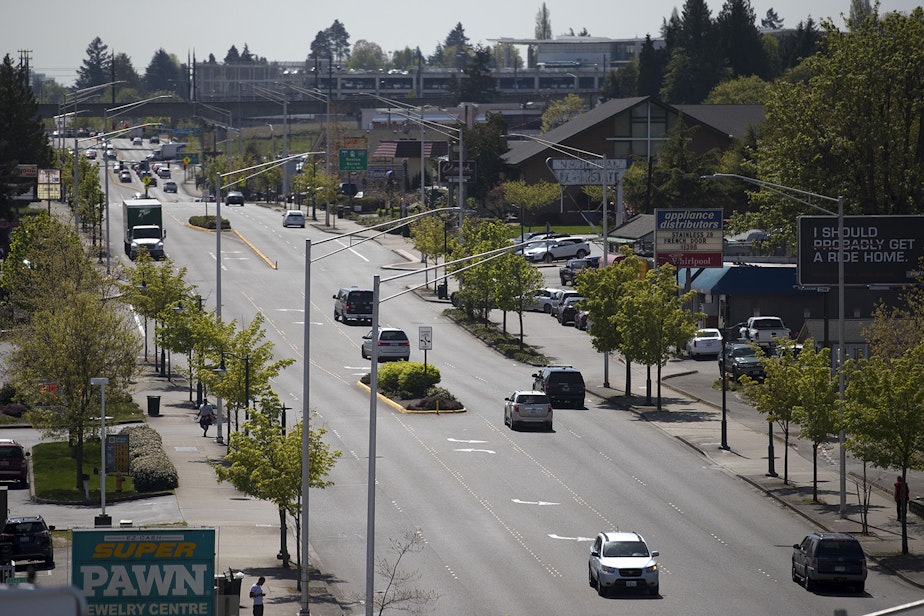Tukwila has a dream for this old highway: Don’t get run over

Tukwila, a small city of about 20,000 people, punches above its weight.
That's partly because it's willing to throw elbows around, seizing property by any legal means necessary in order to turn an aging remnant of highway 99 into the dense, walkable neighborhood many officials want. The technique is effective, but it can leave bruises.
Here are three ways Tukwila officials jostled to build the walkable "main street" they wanted:
1. Tukwila had this problem: You can’t have cars speeding through your neighborhood at 50 miles per hour if you want people to be comfortable walking, biking and living there. And the state was slow in allowing Tukwila to slow down traffic on highway 99.
So, over the protests of Washington's transportation department, they convinced state legislators to snip a section of highway 99 right off the state maps and hand it to the City of Tukwila. Tukwila has given the road an extreme makeover.
Sponsored
But...
2. Investing in the road alone wasn't enough to attract the developers they needed if they were to transform their stretch of former highway 99 into a dense, walkable neighborhood.
They had another problem to overcome first: Crime had plagued that stretch of highway for decades. Even after a light rail station opened on the highway, drugs and prostitution persisted, and developers shied away. Much of the crime was rooted in some old motels run by an organized crime syndicate.
So, Tukwila took the land. After a year of undercover work by Tukwila police, U.S. Marshalls backed by hundreds of officers from around the region seized three motels and handed them to Tukwila. Then-U.S.-Attorney Jenny Durkan (now mayor of Seattle) helped build the legal case. After taking over the motels, Tukwila tore them to the ground, leaving grassy fields ripe for development.
But...
Sponsored
3. While the reduction in crime opened ground for higher end drive through restaurants to move in, that wasn't going to help build the dense, walkable neighborhood Tukwila planners wanted.
Tukwila regularly uses eminent domain and the threat of eminent domain to take land, then sells that land to developers who will build as densely as Tukwila wants. SHAG (Senior Housing for Ageless Generations, in case you've ever wondered) is building a six-story apartment building right up to the sidewalk on land acquired that way.
Now, Tukwila is negotiating with the owner of land that currently houses the Deja Vu strip club. City officials want to put a police station and courthouse there. But that project demonstrates how throwing elbows can leave bruises.
Refugee business owners from places like Somalia and Yemen operate in small spaces on the same land as the strip club.
Up to 16 small business owners expect to be displaced by the justice center project. The city plans to give them about a year and $5,000 to cover their relocation costs, but many say that would force them to close shop completely. This comes at a time when somewhere between 50 and 100 tiny refugee-owned businesses face likely displacement due to a combination of development pressures in the Tukwila-Seatac area (an area at the heart of the Somali refugee community).
Sponsored
At a tense meeting between the business owners and a Tukwila city administrator, Tawfik Moudah, who owns a used car business, asked: “Do you understand our dilemma? Do you understand the 16 businesses that will be directly impacted by this action? Now, finding other solutions, meeting with us is good, you know, it’s nice. But it’s not going to help us save our businesses.”
What we hope to take away from this reporting:
We on the Region of Boom team have looked at how communities, when faced with incredible growth, try to grow inclusively. Most communities fail at this task. But Tukwila has a chance. The city partnered with the mosque on some projects, and city Councilmember Zak Idan is the first Somali American elected into that office. (In fact, he's the first Somali refugee elected in the state!) Now, much depends on how Tukwila treats the refugees who also call this stretch of highway home.
You can follow these stories as we publish them for our series Along the Mother Road.

